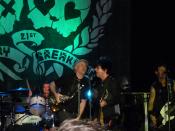CONTENTS
I. Introduction
II. Slang
1. Definition
2. Origins
3. Development of slang
4. Creators of slang
5. Sources
6. Linguistic processes forming slang
7. Characteristics of slang
8. Diffusion of slang
9. Uses of slang
10. Attitudes toward slang
11. Formation
12. Position in the Language
III. Youth Subcultures
1. The Concept of Youth Subcultures
2. The Formation of Youth Subcultures
3. The Increase of Youth Subculture
4. The Features of Youth Subcultures
5. The Types of Youth Subcultures
6. The Variety of Youth Subcultures
IV. Rock Music
1. What is rock?
2. Rock in the 1950s
3. Rock in the 1960s
4. Rock in the 1970s
5. Rock in the 1980s and '90s
V. Rock subcultures
1. Hippie
2. Punk
3. Mod
4. Skinhead
5. Goth
6. Industrial
7. Hardcore
8. Straight Edge
9. Grunge
10. Alternative
11. Metal
VI. Dictionary
1. Dictionary of youth slang during 1960-70's
2. Dictionary of modern British slang
VII. Bibliography
INTRODUCTION
My graduation paper is devoted to the study of the topic "Slang, youth subcultures and rock music." This work consists of 5 parts. The first part is about slang. What is it?
Slang, informal, nonstandard words and phrases, generally shorter lived than the expressions of ordinary colloquial speech, and typically formed by creative, often witty juxtapositions of words or images. Slang can be contrasted with jargon (technical language of occupational or other groups) and with argot or cant (secret vocabulary of underworld groups), but the borderlines separating these categories from slang are greatly blurred, and some writers use the terms cant, argot, and jargon in a general way to include all the foregoing meanings.
Origins of slang
Slang tends to originate in subcultures within a society. Occupational groups (for example, loggers, police, medical professionals, and computer specialists) are prominent originators...



Well researched
I thought it was a cool paper.
5 out of 7 people found this comment useful.